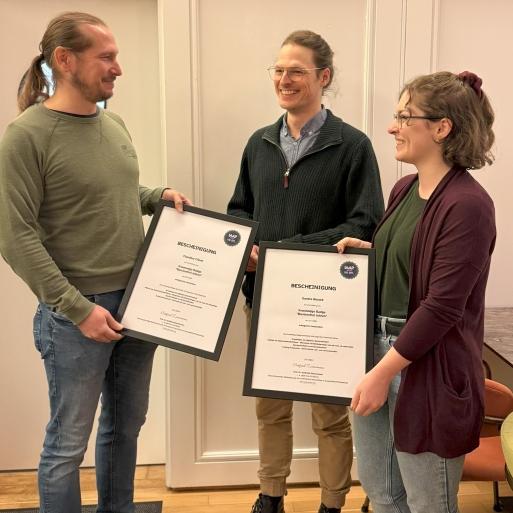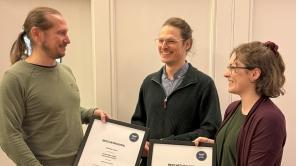University makes a strong case for barrier-free teaching
University makes a strong case for barrier-free teaching
Inconspicuous obstacles, such as documents that are difficult to read or disruptive lighting conditions, can massively restrict teaching - in order to make their own courses barrier-free and make it easier for students to access them, lecturers at the University of Siegen can now train themselves through an online self-study course. The Knowledge Badge "Barrier-free teaching" is a digital knowledge certificate including a final exam, which the University of Siegen offers as one of four associated partners.
The digital course gives lecturers an overview of what accessibility means and what types of restrictions there are. It also offers practical solutions and recommendations for action - from the accessible design of digital documents to organizational measures for courses. The units are divided into four modules. Participants learn the basics, gain insights into the diversity of user needs and accessibility in the university context and learn how to create accessible documents and teaching materials in the "Tooling & Documents" module.
"Most of the time, it's a lot of little things that can make a big difference, such as speaking clearly and distinctly and making sure that you can be seen so that people who are hard of hearing can also follow by lip-reading. Such measures don't mean any extra effort - you just have to be aware of them," explains Sven Bittenbinder. He is a research assistant at the Chair of Information Systems, in particular IT for the ageing society at the University of Siegen. As part of the organizing team, he brought the Knowledge Badge exam to Siegen.
It is particularly important for blind or visually impaired people to make documents and slides digitally readable so that a screen reader can recognize them and read them aloud if necessary. Uploading slides and materials also makes it easier for many students to concentrate on the session. Not only physical but also mental limitations, such as epilepsy, play a role. It is often enough to darken the room during bright slide presentations or avoid bright colors and strobe lighting to make the situation more pleasant.
"We are proud to be one of the first universities to offer this training. Accessibility is a topic that is becoming increasingly relevant. Around 90 percent of all disabilities occur in the course of life due to illness or accidents, so accessibility affects us all," says Prof. Dr. Claudia Müller from the Chair of Information Systems, in particular IT for the ageing society. With this offer, the University of Siegen is sending an important signal as part of its action plan for diversity and equal opportunities.
Registration and information on the "Accessible Teaching"course
The online course is accessible via the IAAP (International Association for Accessibility Professionals). It comprises around 20 to 25 hours of self-study and can be started at any time. During the current pilot phase, lecturers at the University of Siegen can take part free of charge. In order to obtain the certificate, an attendance examination via the Moodle learning platform is required. This can be taken at the University of Siegen - the next exam will take place on March 20 at 2 pm.
Anyone interested can register for the online course via the IAAP website .


